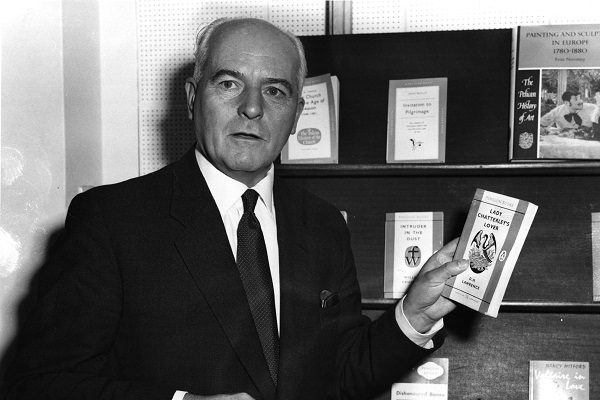A few weeks ago, three colossal boxes of new books from Penguin arrived in the bookshop. I made myself a strong cup of tea and then began the lengthy task of unpacking them, taking out the books and piling them up in neat stacks, ready to tick them off the invoice before zapping them on to our computer system and putting them out on the shop floor.
Rather unusually, one stack of books was visibly shrinking, even as I added to it. Strictly Bipolar is a smartly designed, pocket-sized paperback, in which psychoanalyst Darian Leader challenges the rise of ‘bipolarity’ as a solution to complex problems. There were ten copies of this book in the delivery, but it seemed that any customer who found his or her way to the back of the little bookshop couldn’t help but take one. By the time I’d finished unpacking the boxes, there were only four copies left.
Strictly Bipolar is published as a ‘Penguin Special’, a smart series of books about current, contentious subjects. Penguin Specials are short, cost only £5, and – crucially – very topical. Last year, Occupy by Noam Chomsky was published in the same series, and Ai Weiwei Speaks came out the year before.
Evidently, given the relatively high sales (20,500 copies of Occupy and 3,500 of Strictly Bipolar in just its first month of publication), I’m not the only one to find these books irresistibly compelling. And yet, given that we tend to get more and more of our information about current affairs from the internet – often for free – it is perhaps surprising that this series of printed books is such a success.
The Penguin Special series dates back to the beginning of Penguin’s history. I expect you are familiar with the inspiring story of publisher Allen Lane, who, when coming back from a stay with Agatha Christie in 1934, found that he couldn’t buy a decent book at Exeter train station’s bookstall. He resolved to fill this gap by reissuing good hardback books in cheap paperback format … and so Penguin was born. In Spring 1935, the first ten books went on sale for sixpence each, including novels by Ernest Hemingway, Dorothy L. Sayers, and, fittingly, Agatha Christie.
It was only two and a half years later, at the end of 1937, that the first Penguin Special appeared. The series was launched with the following announcement:
A new series of up-to-the-minute topical books – Penguin Specials – to be published from time to time outside our normal schedule. Early next year we shall continue the series with two very important, entirely new books on current foreign affairs specially written for us by absolutely reliable experts.
The first book was Germany Puts the Clock Back by Edgar Mowrer, which was about Hitler’s regime. The initial print run of 50,000 copies sold out within a week. For comparison, Jamie’s 15 Minute Meals – the bestselling non-fiction book of last year, incidentally also published by Penguin – sold 20,600 copies in its first week of publication.
As the second world war drew closer, Penguin published more and more of them. They continued through the war and by May 1945, they’d published a torrent of 153 Penguin Specials. These were titles that engaged with the numerous political debates of the moment, such as The Jewish Problem, What Hitler Wants, Our Food Problem, and The Internment of Aliens.
After the war, the Specials seemed to all but disappear, only returning with anything like as much force in the Sixties, a decade which saw the publication of around ninety of them. These included a ‘What’s Wrong with Britain’ collection, which interrogated various national institutions, and others which examined international dilemmas, such as Biafra, Vietnam, and Berlin. Sadly this spurt of Specials was short-lived and their numbers dwindled, eventually dying out after the publication in 1988 of Under Siege: racism and violence in Britain today.
Until now, that is.
After twenty-five years of dormancy, it would seem that once again there is a demand for a short, reliable, printed briefing on a current issue, in spite of the proliferation of online information and eBooks.
I wonder if we don’t all feel rather overwhelmed by the huge number of articles online. There is simply too much to read – an infinite, impossible amount – and in a veritable forest of links, it becomes hard to see the wood for the trees. Print conveys a certain authority on words, and perhaps even a short book has more clout than a digital essay. Penguin Specials offer more depth than a newspaper or magazine article, and yet their brevity makes them less intimidating than a weighty tome. They are a winningly approachable means of getting a digestible, insightful briefing on a vital, current issue.
Moreover, perhaps their success suggests that we want to flaunt our intelligence. There is a certain cache in being seen to be reading a clever topical book, announcing your thoughtful engagement with a current issue to anyone who cares to glance your way. This is lost on a Kindle, or iPad, when people tend to assume you’re either reading erotica or playing Angry Birds. The success of the Penguin Specials suggests that people who want to read serious work – and the Penguin Specials are nothing if not serious – are inclined to do so in print.
If this resuscitation of Penguin Specials indicates a time of anything like as much upheaval as the second world war or the Sixties – when the series last flourished – then perhaps our revolution will take the form of a quiet questioning of how we get our information. We might not abandon our tablets, our compressed tweets and live feeds; but, alongside this proliferation of endlessly updating ephemera, perhaps we will increasingly turn to printed-and-bound books as something reliable and reassuringly solid. Penguin Specials are a reminder of the very special power of the printed word.
Emily Rhodes blogs at Emily Books and tweets @emilybooksblog






Comments